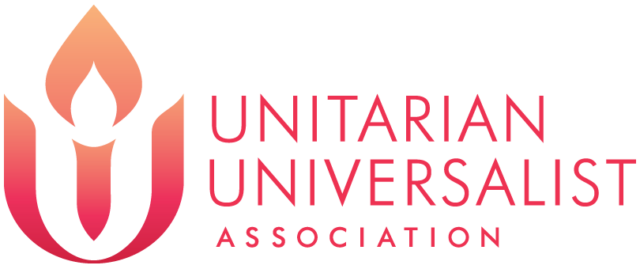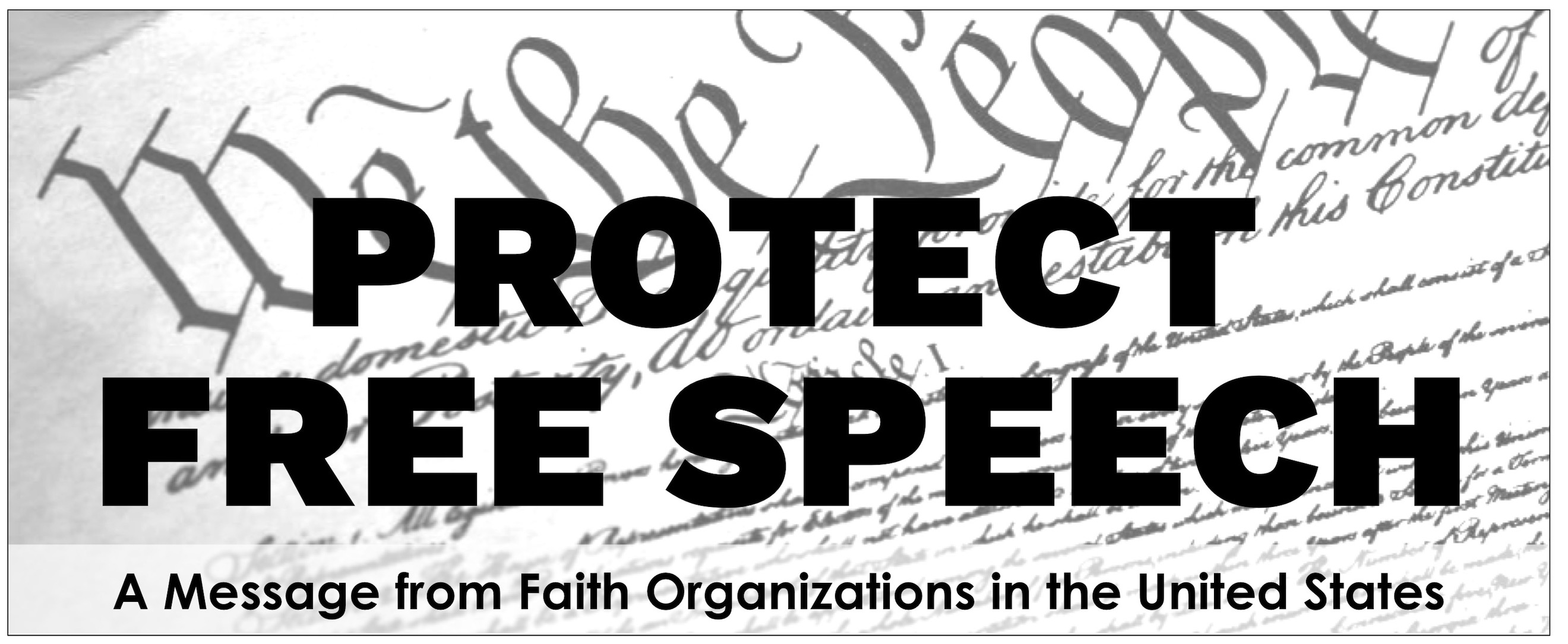See Palestine Portal’s page covering anti-BDS legislation in Congress in 2017
• Unitarian Universalists take action to protect the right to boycott
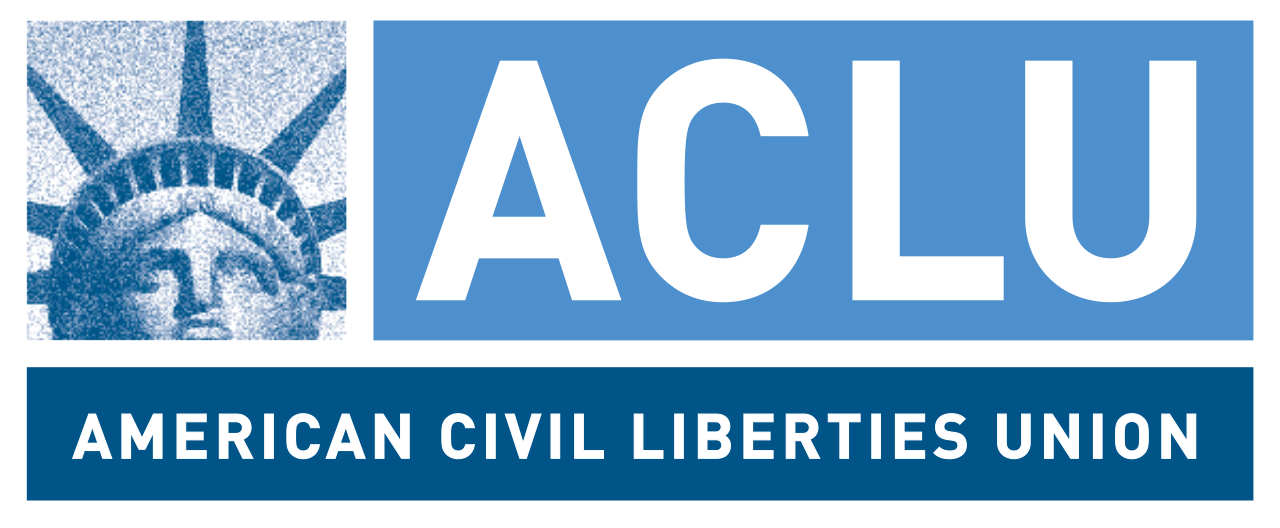 • Faith coalition takes action to protect free speech rights: full page statement published in Kansas City Star by dozens of faith organizations.
• Faith coalition takes action to protect free speech rights: full page statement published in Kansas City Star by dozens of faith organizations.
• Open Letter to Congress, November 2017, from 20 top Christian leaders in the US, from 17 national organizations and agencies, opposing the Israel Anti-Boycott Action
• ACLU report on October 2017 lawsuit on behalf of Kansas teacher, challenging state’s anti-BDS legislation
• News & Commentary on that lawsuit
![]()
Unitarian Universalist Association Adopts Action to Support Right to Boycott
June 2019 – Unitarian Universalists for Justice in the Middle East (UUJME) [see more about UUJME here] has been persistently bringing resolutions on Palestine to the Unitarian Universalist General Assembly for years. Recently, UUJME achieved an important victory at the GA in Spokane, WA. Entitled “Support Our First Amendment Right to Boycott,” this “Action of Immediate Witness” (a form of resolution employed by the UUA) provides a powerful and useful model for how promoting justice for Palestine serves to advance the cause of democracy and equality on a broad scale. Framed by an overview of the anti-BDS legislation that has been successfully adopted in 27 states, the resolution notes that the backlash against the growth of support for Palestinian rights has taken the form of a “major effort to damage the movement for Palestinian rights with legislation aimed at intimidating or even criminalizing participation in boycotts directed at changing Israeli behavior.” Click here for more and to download the document.
Do not miss the poster UUJME created to educate their fellow Unitarians about this action. It very effectively relates the BDS movement to the history of boycotts for human rights, asserting its legitimacy and constitutional basis, and relates the Palestinian call to the broader history of calls for nonviolent resistance supported by churches over the decades. Available for download on this page, it is a powerful tool for our movement — and UUJME encourages you to download it and use it!
Back to top
Broad faith coalition call on Americans to protect First Amendment rights from current and growing legislative threats
In a historic show of unity, dozens of faith organizations publish a full-page newspaper advertisement, one day after 20 top Christian leaders send an open letter to Congress. Both defend the right to boycott as constitutionally protected free speech and oppose anti-BDS laws that violate Americans’ rights.
November 9, 2017 – A full-page statement was published on November 7th in The Kansas City Star, calling on all Americans to oppose those state and federal laws known as “anti-BDS legislation that penalize our right to freedom of speech in the form of boycotts.
The statement’s signatories and endorsements include three denominations – The Alliance of Baptists, The Presbyterian Church (USA) and The United Church of Christ – and dozens of faith-based organizations in mainline Protestant churches, Jewish and Muslim organizations, and many others.
The statement defends American’s First Amendment right to use boycotts and other economic acts of conscience to protest Israel’s abuses of Palestinian human rights and violations of international law.
The newspaper statement comes just one day after 20 Christian leaders representing 17 faith-based organizations sent an open letter to all members of Congress [see it just below], opposing the “Israel Anti-Boycott Act.” The letter was sent by diverse Christian leaders in the U.S., from the National Council of Churches, The United Methodist Church, The Evangelical Lutheran Church in America, The United Church of Christ and a dozen others.
Over the past several years, a series of laws intended to suppress boycotts related to Israeli human rights abuses have been passed in Congress and two dozen states across the country; more punitive legislation, known as the Israel Anti-Boycott Act, is now pending in Congress. The ACLU and other civil liberties groups have warned that these laws are unconstitutional and pose a serious threat to the First Amendment right to freedom of speech, which the Supreme Court has made clear includes the right to boycott.
In 2017, a member of the Mennonite Church was prevented from working as a teacher on a state contract because she supports her church’s call to boycotts in support of Palestinian rights. In October, ACLU filed a lawsuit on her behalf against the Kansas State Dept of Education, in the first major legal challenge to anti-BDS legislation.
The statement in the Kansas City Star also addresses the widespread phenomenon of such legislation in the U.S.:
“We are alarmed by legislation recently passed in a number of states penalizing participation in the nonviolent, grassroots Boycott, Divestment, and Sanctions (BDS) movement for Palestinian rights, and by similar legislation that is proposed in the U.S. Congress… As faith leaders, we have long used the nonviolent instruments of boycott and divestment in our work for justice and peace.”
The statement concludes with a call to all Americans to join us in “defending our First Amendment right to freedom of speech. Urge state legislators and members of Congress to reject anti-BDS legislation as an infringement on the rights of American citizens. “
Use this action link for all concerned Americans to send that message in one step to their members of Congress, the White House, their state legislators and their Governors.
In recent years, a growing number of Americans, including mainline Christian denominations such as The United Methodist Church, The Presbyterian Church (USA), The Evangelical Lutheran Church in America, The United Church of Christ, and the Mennonite Church USA, have called for boycotts or implemented investment screens in support of Palestinians struggling peacefully for their freedom from Israel’s oppressive, 50-year-old military occupation regime.
As the Nov 7th newspaper statement notes, Americans have a long and honorable tradition of using boycotts to address injustice and support human rights causes, from the Civil Rights movement, to the struggle against apartheid in South Africa, to attempts to protect the rights of immigrants, people of color, and others whose rights are threatened today.
There should be no free speech exclusion for Americans who support Palestinian rights and freedom.
Read the full text of the newspaper statement in the Kansas City Star
Back to top
Twenty Christian Leaders representing 17 national organizations send open letter to Congress, opposing anti-BDS legislation
A letter published one day before the full page statement from dozens of faith-based organizations published in the Kansas City Star – see above.
November 6, 2017
Dear Members of Congress,
We write as U.S. Christian churches and organizations committed to justice and peace in the Middle East. This commitment stems from our connections to the Biblical and historical places of our faith; our continuing partnership and engagement with churches and other religious institutions there; and our theological understanding of peace with justice, which compels us to support nonviolent means to end the 50-year-old occupation and support equal rights for all people—Israelis and Palestinians alike.
We are deeply concerned by the introduction of the “Israel Anti-Boycott Act” in the Senate (S.720) and in the House (H.R.1697). This legislation, if adopted, would put legal obstacles in the way of nonviolent peaceful action meant to bring about social change, and would legislate against the freedom to make choices in the stewardship of our financial resources. The bills also conflate Israel and the settlements, erasing the important distinction between Israel and its illegal settlements in the occupied Palestinian territories. They further imply that opposition to Israel’s practices in the territories is the same as being anti-Israel. We are troubled by the bills’ intent to penalize or criminalize the use of economic measures as a legitimate means of opposing policies that inhibit human rights, in this case, of the Palestinians.
We are concerned by any legislation that suppresses legitimate criticism of public policy, and that restricts freedom of expression and our ability to determine our own witness through investment and selective purchasing practices. While we may not be of one mind about which measures are most effective, we collectively affirm and defend the right of churches and organizations to use economic measures in the specific case of Israel-Palestine. This is consistent with how churches and church-related organizations have employed economic measures as nonviolent tactics in many instances of seeking justice and peace throughout history.
As churches and church-related organizations, we all share a hope and desire for an end to occupation, an end to violence and terrorism, and for equal rights for all people. If our respective denominations and organizations, through debate and reflection, adopt policies that employ economic leverage to advance these policy objectives, as we do with many other policy objectives, we believe it is our right to do so. It is an assertion of our right as stewards of our financial resources to spend and invest according to our theological and moral conviction, expressed in our respective denominational or organizational policies.
In this case, our assertion of this right is an effort to change unjust Israeli policy toward Palestinians, not to delegitimize the State of Israel, nor to marginalize or isolate our Jewish neighbors, or their enterprises. Our choices to purchase and invest responsibly, and to advocate with corporations or governments, are motivated by our firm commitments to justice and peace for all people, without discrimination or exclusion.
As churches and church-related organizations, we reject any efforts by the state to curtail these rights. We urge you to oppose the proposed legislation, and thus support the rights of individuals and institutions to spend and invest in accordance with their faith, values, and policies.
Sincerely,
Joyce Ajlouny
General Secretary
American Friends Service Committee
Rev. Teresa Hord Owens
General Minister and President
Christian Church (Disciples of Christ)
Eli S. McCarthy, PhD
Director of Justice and Peace
Conference of Major Superiors of Men
Brother Larry Schatz, FSC
De La Salle Christian Brothers of the Midwest
The Rev. Elizabeth A. Eaton
Presiding Bishop
Evangelical Lutheran Church in America
Diane Randall
Executive Secretary
Friends Committee on National Legislation
Rev. Dr. Susan Henry-Crowe
General Secretary
General Board of Church and Society
The United Methodist Church
Rev. Julia Brown Karimu
Co-Executive
Global Ministries of the Christian Church (Disciples of Christ) and United Church of Christ
Rev. Dr. James Moos
Co-Executive
Global Ministries of the Christian Church (Disciples of Christ) and United Church of Christ
Gerry Lee
Director
Maryknoll Office for Global Concerns
J Ron Byler Executive
Director
Mennonite Central Committee U.S.
Ervin Stutzman
Executive Director
Mennonite Church USA
Jim Winkler
President and General Secretary
National Council of Churches of Christ in the USA
Nathan Hosler
Director
Office of Public Witness
Church of the Brethren
Marie Dennis and Bishop Kevin Dowling, CSsR
Co-Presidents
Pax Christi International
Sister Patricia Chappell
Executive Director
Pax Christi USA
J. Herbert Nelson, II
Stated Clerk
Presbyterian Church (U.S.A.)
Donald J. Poest
Interim General Secretary
Reformed Church in America
Rev. Dr. John Dorhauer
General Minister and President
United Church of Christ
Back to top
ACLU Free Speech Case Challenges Law Aimed at Anti-Israel Boycotts [1]
 Kansas Law Requires Contractors to Sign Document Promising Not to Boycott Israel
Kansas Law Requires Contractors to Sign Document Promising Not to Boycott Israel
TOPEKA, Kan. — The American Civil Liberties Union filed a federal lawsuit today arguing that a Kansas law
requiring a high school educator to certify that she won’t boycott Israel violates her First Amendment rights.
The law, which took effect on July 1, requires that any person or company that contracts with the state submit a written certification that they are “not currently engaged in a boycott of Israel.”
The Supreme Court ruled decades ago that political boycotts are protected [2] by the First Amendment, and other decisions have established that the government may not require individuals to sign a certification regarding their political expression in order to obtain employment, contracts, or other benefits.
“The First Amendment prohibits the government from using its financial leverage to impose an ideological litmus test,” said ACLU attorney Brian Hauss. “This law is an unconstitutional attempt by the government to silence one side of a public debate by coercing people not to express their beliefs, including through participation in a political boycott.”
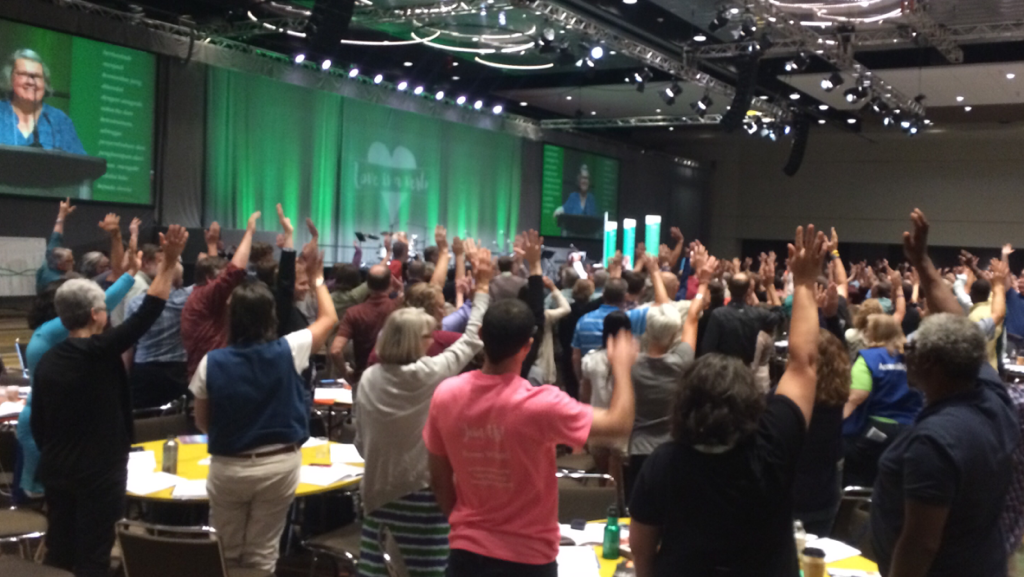
The ACLU represents Esther Koontz, who belongs to the Mennonite Church USA. In accordance with calls for boycott made by members of her congregation and her church, Koontz decided not to buy consumer products made by Israeli companies and international companies operating in Israeli settlements in the occupied Palestinian territories. Koontz participates in this boycott in order to protest the Israeli government’s treatment of Palestinians and to pressure the country to change its policies.
Having served as a public school math teacher for nine years, Koontz now develops her school’s math curriculum and trains teachers on how to implement it. She is also qualified to train teachers statewide as a contractor with the Kansas Department of Education’s Math and Science Partnerships program. When Koontz was asked to certify that she does not participate in a boycott of Israel, she said that she could not sign the form in good conscience. As a result, the state refuses to contract with her, and she is unable to participate as a trainer in the state’s program.
“You don’t need to share my beliefs or agree with my decisions to understand that this law violates my free speech rights. The state should not be telling people what causes they can or can’t support,” Koontz said. “I’m disappointed that I can’t be a math trainer for the state of Kansas because of my political views about human rights across the globe.”
The Kansas law is similar to legislation that has been passed in other states. The ACLU does not take a position on boycotts of foreign countries, but the organization has long supported the right to participate in political boycotts and has voiced [3] opposition [4] to bills that infringe on this important First Amendment right.
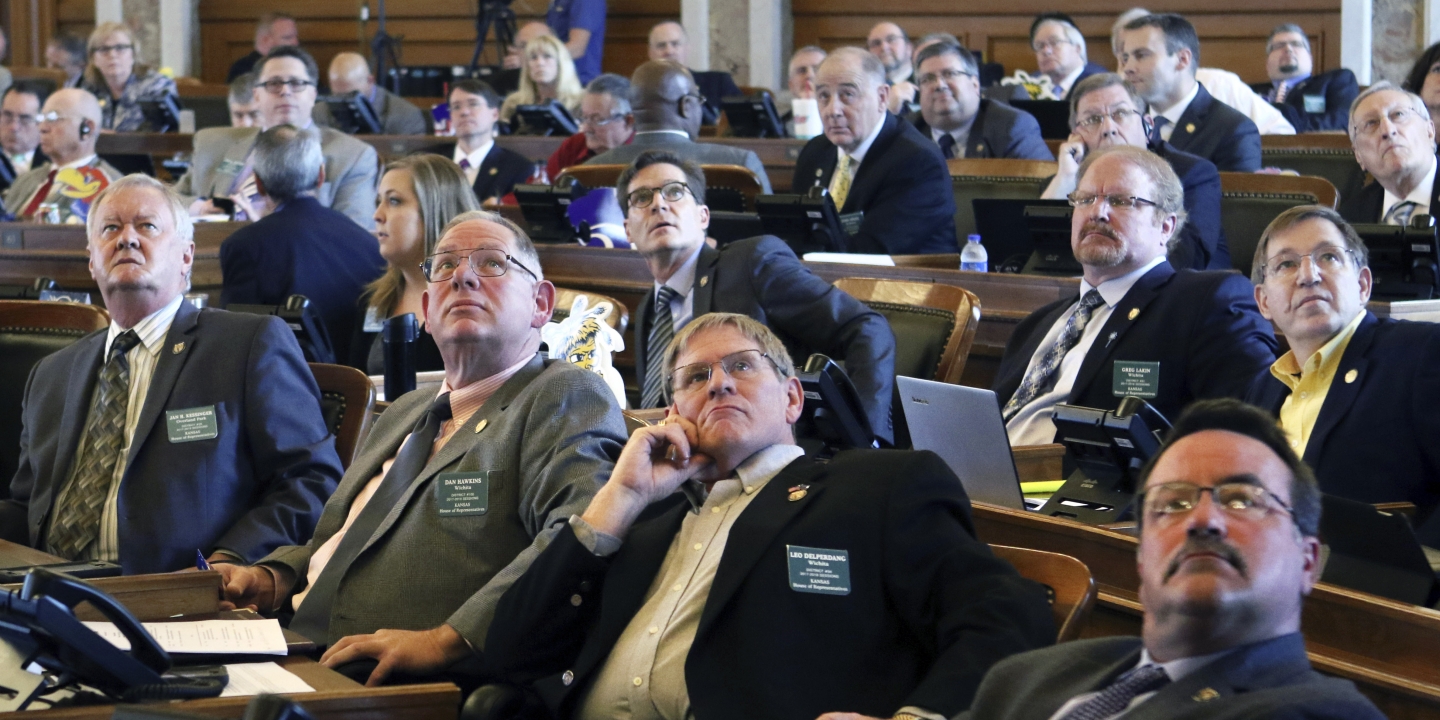
In July, the ACLU sent a letter to members of Congress opposing [5] a bill that would make it a felony to support certain boycotts of companies doing business in Israel and its settlements in the occupied Palestinian territories. As a result, Senate sponsors of the bill are considering changes.
Today’s complaint is here:
https://www.aclu.org/legal-document/koontz-v-watson-complaint
Today’s preliminary injunction memo is here:
https://www.aclu.org/koontz-v-watson-memorandum-support-plaintiffs-motion-preliminary-injunction
Source URL: https://www.aclu.org/news/aclu-free-speech-case-challenges-law-aimed-anti-israel-boycotts
Links
[1] https://www.aclu.org/news/aclu-free-speech-case-challenges-law-aimed-anti-israel-boycotts
[2] https://www.aclu.org/blog/free-speech/first-amendment-protects-right-boycott-israel
[3] https://www.aclu-ia.org/en/news/penalizing-businesses-boycott-restricting-free-speech
[4] https://static1.squarespace.com/static/548748b1e4b083fc03ebf70e/t/558046cce4b014e817c3cb0e/1434470092641/HB1018PABoycottBillLetterFinal.pdf
[5] https://www.aclu.org/blog/free-speech/how-israel-anti-boycott-act-threatens-first-amendment-rights
Back to top
News and Commentary
Palestine Legal – Lawsuit Challenges Unconstitutional Anti-BDS Bill in Kansas – 11-Oct-2017
Ha’aretz – In America, the Right to Boycott Israel Is Under Threat. This Is Why That’s Cause for Concern – 11-Oct-2017
Associated Press/NY Times (also in Washington Post, Chicago Tribune) – ACLU Sues Over Kansas Law That Targets Israel Boycotts – 11-Oct-2017
Electronic Intifada – Federal lawsuit filed against Kansas anti-BDS bill -11-Oct-2017
ACLU / Esther Koontz – Kansas Won’t Let Me Train Math Teachers Because I Boycott Israel – 12-Oct-2017
Israel/Palestine Mission Network (IPMN), Presbyterian Church USA: We Stand with Esther Koontz: Protecting the Right to Protest through Economic Actions
Huffington Post – Mennonite Math Teacher Sues Kansas For Not Hiring Her Because She Boycotts Israel – 12-Oct-2017
Mondoweiss – Wichita teacher sues Kansas for denying her work because she boycotts Israel – 13-Oct-2017
The Intercept – Kansas Is Punishing a Teacher for Following Her Church’s Guidance to Boycott Israel – 13-Oct-2017
Back to top




